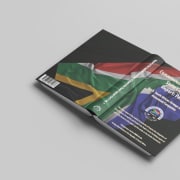|
Getting your Trinity Audio player ready...
|
South African Airways (SAA) did not avoid the TNA Media contracts that continue to dog the legacies of fellow state-owned entities (SOEs) Transnet and Eskom. Evidence led before the state capture commission on the airline’s dealings with the Gupta-owned media company was narrowed to two witnesses – its former board chairs Cheryl Carolus and Vuyisile Kona.
The first report of the commission, chaired by Acting Chief Justice Raymond Zondo, concluded that Kona neglected his fiduciary duty when he submitted to pressure regarding the subscription spend of the airline in late 2012. According to the former acting CEO, TNA was already doing business with SAA when he joined the board in September, before moving on to act in the CEO’s position following the abrupt departure of Siza Mzimela.
Kona was initially approached by Siyabonga Mahlangu – advisor to then public enterprises minister Malusi Gigaba – soon after his appointment as acting CEO in October, who requested that SAA’s subscription to TNA-owned New Age newspaper be increased.
His response to Mahlangu was to suggest that he approach the supply chain management unit of SAA instead. Oddly, weeks later Kona received a proposal from its bid adjudication committee (BAC) for his approval of increased subscription volumes from 3 000 copies per day to 7 000, at an extra cost of R2.4-million per year.
He approved this, though the BAC provided no reasons for the increase. There was also no budget for the added cost, but when quizzed on the rationale behind approving the added spend, Kona said his planned strategy for SAA – which would yield more profitability – would compensate for the unscheduled extra cost.
Zondo notes in the report: “Mr Kona’s approval of the increased subscription with no evidence of effectiveness, circulation, affordability or commercial value, was a breach of his fiduciary duties to SAA and of his obligations under the PFMA [Public Finance Management Act] to avoid irregular expenditure as there was no budget to support the increase. It also amounted to wasteful expenditure as there was no information about the commercial value of the subscription to SAA.
“Mr Kona said that the absence of any budget did not concern him because he thought that the operational changes and expansion of the SAA network that he was planning to implement would free up some cashflow and so it would be affordable. He accepted, however, that he made the decision to approve the increase without any knowledge of what the TNA readership was at the time.”
The report further points out that there was a series of “curious” text messages between Kona and Mahlangu, which the former defended in his testimony by saying he felt the need to keep Mahlangu abreast of developments in the subscription process, given that he had initially been approached by him.
Kona’s predecessor Carolus had also been approached in 2011 to consider SAA’s position on TNA subscriptions, and she too testified to Mahlangu’s involvement in at least one meeting she and Mzimela were summoned to by then director-general of the Department of Public Enterprises, Tshediso Matona. The meeting was called after she suggested – like Kona would later – that TNA approach the BAC to propose subscription terms, after the company had approached her. Matona grilled her on her decision, which she did not change.
“Ms Carolus testified that the meeting had not followed due process within the organisation because ordinarily an appeal against a fair competitive procurement process would have at least first gone to the CEO before it reached board members,” Zondo notes.
“She regarded it as inappropriate for the director-general to choose this forum to plead his case to her as chair of the board. At the meeting, Mr Matona told Ms Mzimela, the CEO and Ms Carolus, the Chair, that TNA was a new entrant in the market and so in order to promote media diversity, SAA should support TNA.”
Carolus testified that, while she had sympathy with the mandate of developing new entrants to the media, this was not the role or mandate of SAA. This fell to entities like the Industrial Development Corporation and Public Investment Corporation.
“It would have therefore been a violation of SAA’s mandate and role to invest in TNA the way Mr Matona was requesting. Ms Carolus regarded Mr Matona’s appeal to them as inappropriate.”
Of the role played by Mahlangu in this process, and generally in the operations of SOEs, Zondo writes: “[Mahlangu’s] evidence was that his interactions with SOEs and the Guptas were in the discharge of his duties as Minister Gigaba’s advisor. This would mean that he would have reported back to Mr Gigaba on his interactions with SOEs and the Guptas.
“The problem with this response, however, is that it overlooks the vital point that public entities like SAA are spending public funds. They must therefore make procurement decisions based on the proper processes and only if it is in the interests of the business.”
Zondo’s general conclusion on the relationship between SOEs and the Guptas is that the family’s approach was a calculated one.
“The contracts concluded by the SOEs were often patently irregular and wasteful by definition because their value simply could not be established. The fact that this was never picked up and addressed, bar a whistle-blower report (that was effectively swept under the carpet by the new Eskom board), reveals a staggering lack of accountability in the public sector between 2011-2017, while millions of Rands from the public purse were diverted to the TNA.”







